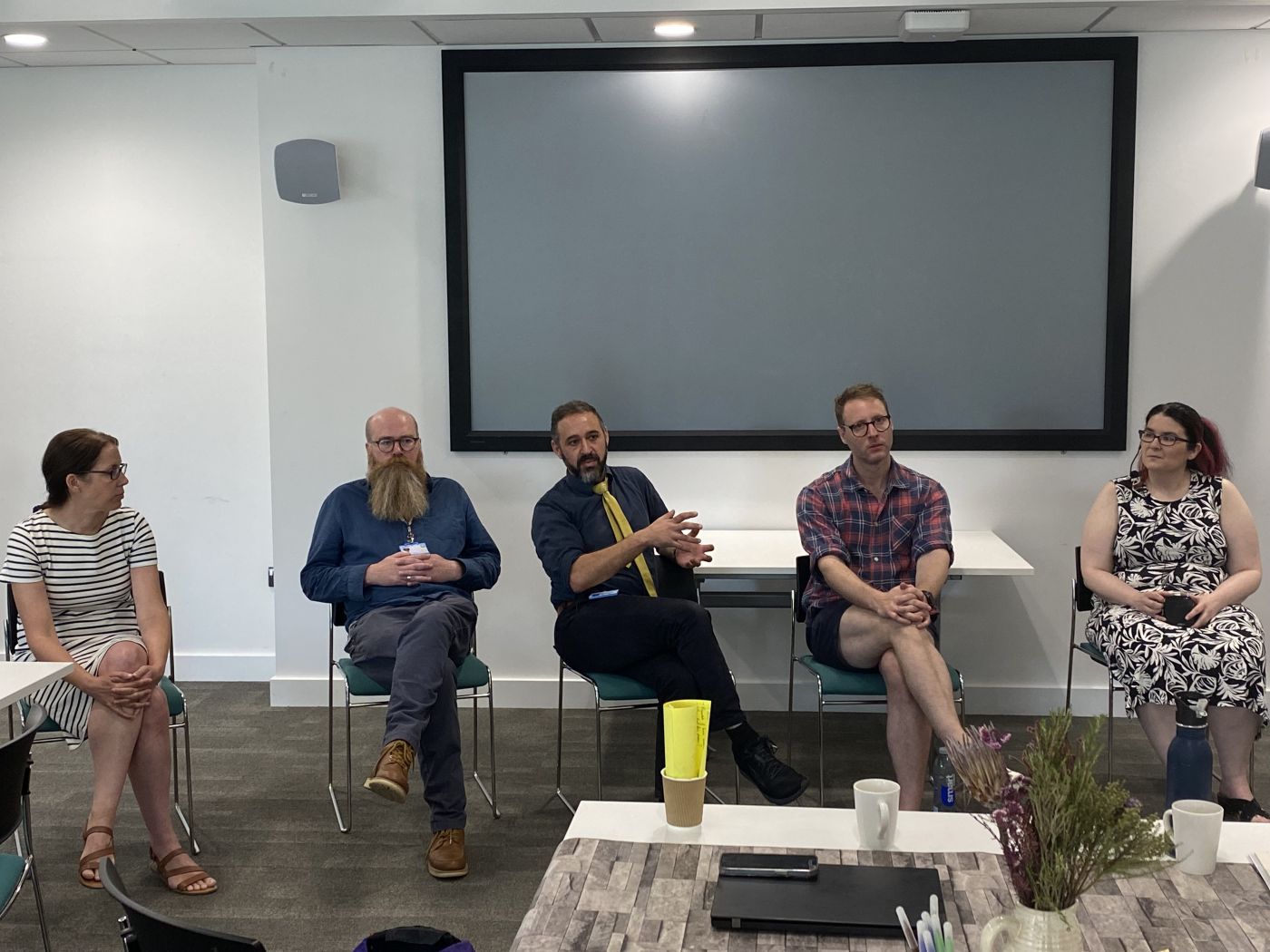 The first in a series of interdisciplinary research seminars run by the Centre for Wellbeing and Long Term Health (@CWLTH) and the Centre for Science, Health, Data Communication Research (@SHDCResearch) was framed around the partnership formed through a match-funded doctoral studentship between DHC and BU. Andy Sweetmore is researching early-interventions for children and young people who self-harm; he works 15 hours a week clinically as a specialist nurse practitioner within the Closer2Home CAMHS community intensive treatment team.
The first in a series of interdisciplinary research seminars run by the Centre for Wellbeing and Long Term Health (@CWLTH) and the Centre for Science, Health, Data Communication Research (@SHDCResearch) was framed around the partnership formed through a match-funded doctoral studentship between DHC and BU. Andy Sweetmore is researching early-interventions for children and young people who self-harm; he works 15 hours a week clinically as a specialist nurse practitioner within the Closer2Home CAMHS community intensive treatment team.
L-R Dr Claire Young, Consultant Clinical Psychologist and Clinical Service Lead; Dr Phil Morgan, Head of Nursing, Therapies and Quality; Morad Margoum (Interim Service Director DHC) Andy Sweetmore (CAMHS and BU) Professor Ann Luce (BU)
The aims of the symposium were to:
- To explore what the clinical evidence means in the context of working with young people who self-harm, for our local healthcare services
- To discuss the assumptions about self-harm and what actions can be taken
- To gain insights into joint research working between DHC and BU
Morad Margoum, Intermin Service Director (DHC) and on the supervision team, welcomed the symposium delegates, comprising mental health experts and practitioners from across Dorset, school nurses, academics from the Bournemouth University mental health team.
Andy then reported on his systematic literature review, conducted covering publications from January 2004 to March 2024. The inclusion criteria encompassed children and young people aged 4 to 25 years, in educational or primary care settings, and studies reporting self harm outcomes. Definitions of self-harm underpinned the work:
- Self-harm, defined as self-poisoning or self-injury regardless of intent, is associated with an elevated risk of mental health conditions and is a strong predictor of suicide (Iyengar et al. 2018; Mughal et al. 2019).
- Self-harm was previously associated with depression and pervasive emotional dysregulation, however, occurs in almost every mental health condition, including anxiety, anorexia nervosa and schizophrenia (Harris et al. 2022).
- Suicide is the predominant cause of mortality among females aged 15 to 19 globally and is a pressing public health concern (Liu et al. 2022).
The review highlighted a significant gap in robust, high-quality studies on self-harm interventions within educational and primary settings. The limited evidence base suggests potential benefits of school based interventions, but further research with rigorous methodologies is required. It was noted that Iatrogenic harm was not discussed. Interventions to support mental health conditions in any environment carries inherent risks, with Foulkes & Andrews (2023) finding that mental health support within schools may not be as effective or safe as initially presumed. Recent literature (Andrews et al. 2022; Harvey et al. 2023; Montero-Marin et al. 2023), also indicate potential post-intervention deterioration in school-based interventions. Even if only a small fraction of adolescents are adversely affected within a school, the widespread application of these interventions could result in significant harm to thousands, underscoring the importance of assessing even minor adverse effects at scale. Despite the NHS strategy of moving mental health initiatives rapidly into school, these interventions may make some young people worse. There isn’t one therapy which an evidence base points to that can reliably say will be effective, which offers limited treatment options for those who are trying to ensure a standardised provision.
Expert speakers offered their insights, followed by a panel discussion to seek comment, clarification and a focus for the lively debate that followed. The next steps include disseminating the insights and findings from the symposium to inform the prospective CAMHS clinical transformation plan, which aims to develop innovative approaches to supporting children and their families, as well as the broader strategy to address self-harm within local mental health services.
Andy Sweetmore is a match funded DHC/BU doctoral student, supervised by Dr Heidi Singleton (DNS) Professor Debbie Holley (DNS) and Professor Ann Luce (FMC)
Heidi and Debbie research as part of Centre for Wellbeing and Long Term Health (@CWLTH) and Ann the Centre for Science, Health, Data Communication Research (@SHDCResearch)
 How farms can help improve the lives of disadvantaged young people
How farms can help improve the lives of disadvantaged young people What can be done for more at-risk young people to become entrepreneurs?
What can be done for more at-risk young people to become entrepreneurs?










 Join the 17th Annual Postgraduate Research Conference – Wednesday 3 December 2025
Join the 17th Annual Postgraduate Research Conference – Wednesday 3 December 2025 BU Festival of Social Sciences invite at RNLI
BU Festival of Social Sciences invite at RNLI MaGPIE Presents at UK Parliament: From Mass Graves to Courtroom
MaGPIE Presents at UK Parliament: From Mass Graves to Courtroom Festival of Social Science: Introducing drowning prevention in Bangladesh
Festival of Social Science: Introducing drowning prevention in Bangladesh ECR Funding Open Call: Research Culture & Community Grant – Apply Now
ECR Funding Open Call: Research Culture & Community Grant – Apply Now MSCA Postdoctoral Fellowships 2025 Call
MSCA Postdoctoral Fellowships 2025 Call ERC Advanced Grant 2025 Webinar
ERC Advanced Grant 2025 Webinar Horizon Europe Work Programme 2025 Published
Horizon Europe Work Programme 2025 Published Horizon Europe 2025 Work Programme pre-Published
Horizon Europe 2025 Work Programme pre-Published Update on UKRO services
Update on UKRO services European research project exploring use of ‘virtual twins’ to better manage metabolic associated fatty liver disease
European research project exploring use of ‘virtual twins’ to better manage metabolic associated fatty liver disease